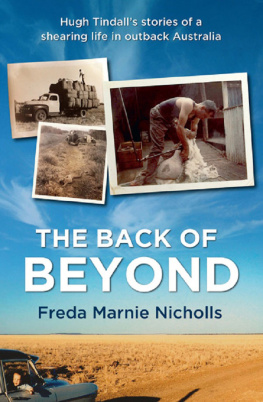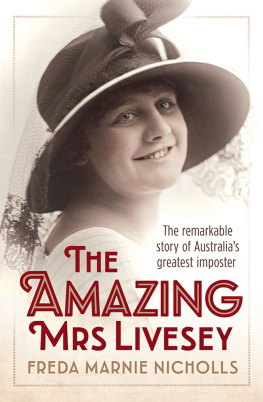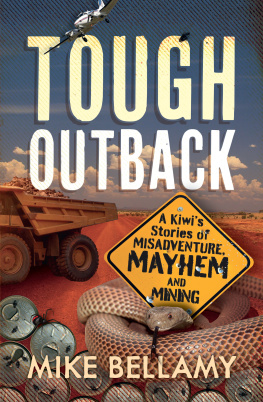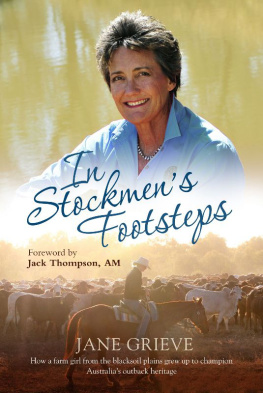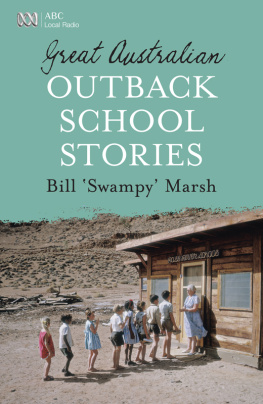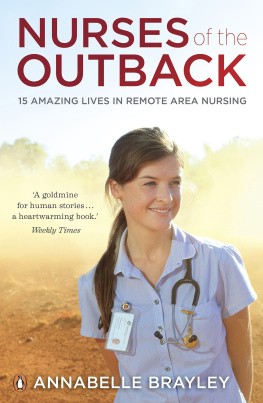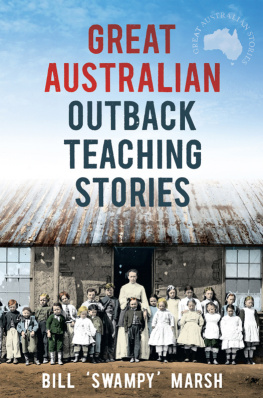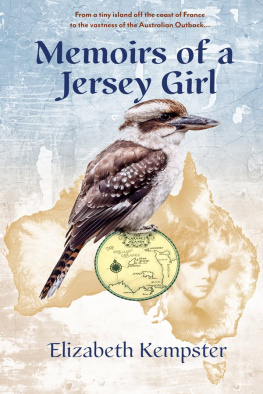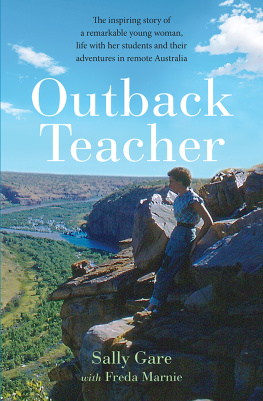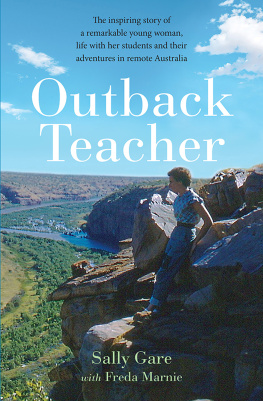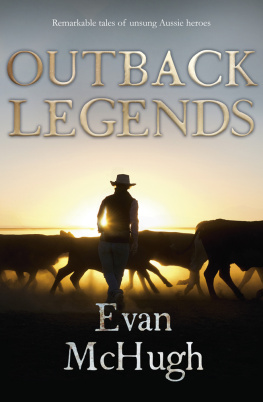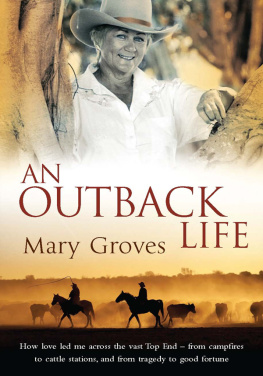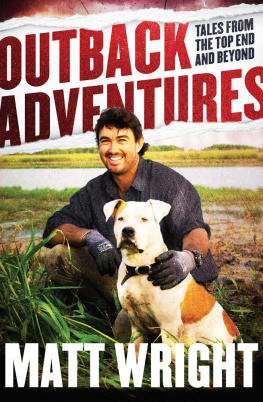
Freda Marnie Nicholls began her writing career with a letter to the editor of a dirt bike magazine, complaining about the fact that she was being left to bring up three little children while her husband was off riding his bike in his spare time. This tongue-in-cheek letter led to a monthly column and gave her the courage to pursue her dream of writing around farming, work and family activities.
Freda lives and works on her husbands family farm in beautiful southern New South Wales and has worked for various national magazines and newspapers, even working as editor for one regional paper for a short time, before realising it was more fun helping on the farm and writing on a freelance basis.
Freda has written articles for The Land, Canberra Times and regional papers, numerous horse and lifestyle magazines, including various publications of RM Williams Outback Publishing, writing mostly about rural people and their lives.
Her first book, Love, Sweat & Tears, was published in 2013.
Dedicated to the hard-working men and women of Australia
First published in 2014
Copyright Freda Marnie Nicholls 2014
All rights reserved. No part of this book may be reproduced or transmitted in any form or by any means, electronic or mechanical, including photocopying, recording or by any information storage and retrieval system, without prior permission in writing from the publisher. The Australian Copyright Act 1968 (the Act) allows a maximum of one chapter or 10 per cent of this book, whichever is the greater, to be photocopied by any educational institution for its educational purposes provided that the educational institution (or body that administers it) has given a remuneration notice to Copyright Agency Limited (CAL) under the Act.
Allen & Unwin
Sydney, Melbourne, Auckland, London
83 Alexander Street
Crows Nest NSW 2065
Australia
Phone: (61 2) 8425 0100
Fax: (61 2) 9906 2218
Email:
Web: www.allenandunwin.com
Cataloguing-in-Publication details are available from the National Library of Australia
www.trove.nla.gov.au
ISBN 978 1 74331 716 7
eISBN 978 1 74343 816 9
Typeset by Post Pre-press Group, Australia
Contents
WRITING IS A solitary pursuit, but I could not have written this book without the help of many.
Thank you firstly to Hugh and Barb Tindall, who welcomed me into their home and lives. It has been an absolute pleasure to work with you and get to know you and your family so well.
My mentor Richard Walsh, whose sage advice I regularly seek; you are a true credit to your profession and a great friend.
The wonderful staff at Regency Park, especially Noo and Chris, thank you for being the computer go-between for Hugh and myself.
Thank you to the wonderful staff at Allen and Unwin, especially my senior editor Siobhn Cantrill; thank you my friend. Once again I had the pleasure of working with Clara Finlay, whose professionalism and common sense is inspiring. Thank you also to Sue Hines and Amy Milne, both dedicated to their profession and delightful women to work with.
Thank you to my long-suffering friends and family, especially Katarina Pearson, Nikki Miller, Annie Green, and the wonderful members of Tuckerbooks Book Club in my hometown of Gundagai, who are a terrific support group, wonderful cooks and put up with my somewhat sporadic attendance.
My family, my backbonethank you. Hayley, Charlotte and Sam, you always make me happy and I love watching you grow into such caring adults. My darling husband Bert, words are never enough, thank you for your support, your love and your wonderful sense of humour. I love you, mountains even.
Sometimes, especially for a writer, two words dont seem enough, but, thank you.
Chapter 1
Poddy dodgers paradise
MY FIRST MEMORIES are of dry whirly winds. Winds straight off the Simpson Desert; hot winds that would stir the dirt into every nook and cranny, into your eyes, your ears, and through the open fire, mixing gidgee ash into Mums damper.
My Dad, Arthur, successfully drew a selection in 1924, two years before I was born. He named it Red Knob after a small red rise on the boundary of the 31,000 acres (12,500 hectares) of sparse scrubby plains that were to be our home. It was one of eight selections drawn off the edge of Warbreccan Station, 150 mile (240 kilometres) west of Longreach in Central West Queensland.
When the first white people went out into that country, theyd say, My place runs between that mountain and that river. And that was it. There were certainly no surveyors, and the more remote places, like Warbreccan on the channel country in the Diamantina, were over a million acres. Those big blocks were leased from the government, but later on the government took small portions off the edge of them and balloted them off. It encouraged people out into the bush, who then paid a lease fee to the government. Selections were by ballot, almost a lucky dip. There were a lot of selections balloted off after both the First and Second World Wars for returned soldiers, with a few ballots in the surrounding years for whoever wanted to have a go at living on the land.
When you drew a selection you had to go out and live on the block within a certain amount of time in order to claim it. But if the country wasnt much good or there wasnt good water it was hard to make a living out there; if they couldnt make a go of it, some people left the blocks, which would then be resumed back by the government and balloted off again.
Red Knob was a terrible drought-stricken place. It had loose, pale, ashy soil with little or no scrub, and most people thought it was too small to make an honest living on. They called it a poddy dodgers paradise. Poddy dodging is when unbranded calves or poddies are mustered off big properties and branded by the dodger or thief with their own brand. As far as I know, Dad wasnt involved with any poddy dodginghe always despised liars and thieves and was constantly checking his boundaries. In any case, he only ran sheep out there.
It was a depressing sort of place, split in two by a rickety old fence. It was a long way from anywhere and was light-carrying country, not able to carry many sheep through lack of water and feed. The six-foot dingo-proof fence on our western boundary was the last sheep fence out there; after that just the Diamantina and Georgina rivers, which only ran water during the wet season, lay between the Simpson Desert and us.
When you drew a selection, you had to improve the block, clear any timber and build dams, and a certain amount had to be spent on it. If the block was later resumed, you wouldnt usually be compensated for any improvements, like dams or houses. So it was generally expected that anything built was for your use only, nothing more. It was fairly basic living.
First thing Dad did when he got out to Red Knob was build a 30-by-20-foot (nine-by-six-metre) bough shed. It consisted of four rough posts made from the boughs of trees, with four open sides and a cane-grass roof, held down with wire to stop it blowing off. Cane grass looks a bit like miniature bambooit stands three to four foot (around a metre) high and grew mainly around the watercourses and swamps. It was plentiful and so a lot of early huts were thatched with cane grass. Dad then put a few coolabah leaves on top of it, to keep off the worst of the sun. It didnt keep out the rain, but then it didnt really rain much out there anyway. He also had a tent, but it was too hot to use in summer, so we put bullock hides on the ground at night and slept on them under the bough shed.
We all travelled there from Nyngan, in central New South Wales, when I was not quite two. Mum, Dad, my older brother Arthur, me, my new baby brother Godfrey, two thousand sheep, a couple of horses, Dads working dogs, a Model T Ford utility and Dads pride and joy, his 1926 Buick. The Buick was really something in those daysit was too good to use all the time, so it would just stay with us under the bough shed.
Next page
